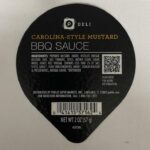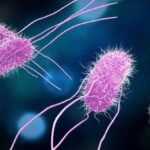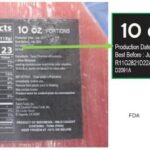The Pie Commission Beef Rib Pot Pie is being recalled in Canada because it may contain anchovies, or fin fish, that are not declared on the product label as required. Anyone who is allergic to anchovies could have a serious reaction if they eat this product. No reactions or illnesses have been reported to the company to date. The recalling firm is Sabatini U. Gourmet Foods Ltd. The recalled product was sold in Ontario at the retail level, and may have been sold in other provinces and territories. The recalled item is The Pie Commission Braised Beef Rib Pot Pie that is sold in 320 gram packages. The UPC number that is stamped on the product label is 6 28678 56205 9, and the best before date and code is 2024 NO 21 3263. The recall was triggered by the company. The Canadian Food … [Read more...]
Publix Deli Carolina Mustard BBQ Sauce Recalled For Anchovy
Publix Deli Carolina Mustard BBQ Sauce is being voluntarily recalled because it may contain anchovy, or finfish, that is not declared on the label as required. Anyone who is allergic to anchovy could have a serious reaction if they eat this product. No reports of illness have been received by the company to date in connection with the consumption of this sauce. The recalling firm is Ventura Foods of Brea, California. The problem is that the sauce actually contains Traditional Sweet & Spicy BBQ Sauce that may have been made with a fish allergen. The recall is for Publix Deli Carolina Style Mustard BBQ Sauce with a use by date of April 8, 2024. The product is packaged in a 2 ounce package and is sold individually. The UPC number that printed on the product label is 0 41415 57162 … [Read more...]
Melissa’s Kimchi Hot Recalled For Undeclared Fish
Melissa's Kimchi Hot is being recalled because it contains fish, one of the nine major food allergens, that is not declared on the product label as required by law. Anyone who is allergic to finfish could have a serious reaction if they eat this product. No illnesses or allergic reactions have been reported to the company to date in connection with the consumption of this product. The recalling firm is World Variety Produce of Los Angeles, California. The recalled product is Melissa's Kimchi Hot that is packaged in 14 ounce jars. There are 1,120 cases of this item that are included in this recall. There are 420 cases from lot number 48528201, 420 cases from Lot number 48858701, 150 cases from lot number 49003901, and 130 cases from lot number 49003901-W0. This item was made in the … [Read more...]
Shirakiku Ajhei Sanuki Udon Noodle Recalled For Undeclared Fish
Shirakiku Ajhei Sanuki Udon Noodle is being recalled because it contains fish, specifically skipjack tuna, that is not declared on the product label as required by law. Anyone who is allergic to fish could have a serious reaction if they eat this product. No illnesses have been reported to the company to date in connection with the consumption of this item. The recalling firm is Wismettac Asian Foods Inc. of Santa Fe Springs, California. This item was sold at the retail level in these states: California, Colorado, Arizona, and Georgia. The recalled item is Shirakiku Ajhei Sanuki Udon Noodle that is packaged in a 19.04 ounce illustrated plastic bag. The UPC number for this item, which is stamped on the back side of the package, is 074410455453. The recall includes all lot codes and … [Read more...]
EWG Study: Eating One Freshwater Fish a Month Problematic
A new study from Environmental Working Group (EWG) says that eating one freshwater fish a month is equivalent to a month of drinking water contaminated with forever chemicals, or PFOS, at levels that might be harmful to your health. PFOS, or perfluorooctane sulfonic acid, is one of the so-called "forever chemicals" because they do not break down in the environment. PFOS are found in food packaging, nonstick cookware, firefighting goats, and waterproof clothing. They, along with other PFAS chemicals, have been linked with the development of testicular and kidney cancer, weakened immunity, low birth weight, and endocrine disruption, along with fertility problems, according to the Harvard School of Public Health. These chemicals are everywhere, including in our food and our bodies. … [Read more...]
Frozen Pacific Fusion Tuna Steaks Recalled For Histamines
Frozen Pacific Fusion tuna steaks are being recalled for elevated histamine levels, which can cause an allergic reaction called scombroid fish poisoning. Symptoms of this reaction can include tingling and burning in the mouth, facial swelling, hives, itchy skin, nausea, vomiting, and diarrhea. These symptoms typically appear within minutes to several hours after eating contaminated fish. One consumer complaint triggered this recall. If these symptoms are severe, medical treatment should be sought. The recalling firm is Relish Foods of El Segundo, California. The recalled item is Frozen Pacific Fusion Tuna Steaks that are packaged in 10 ounce containers. They were sold in Northern California and were made for sale at Save Mart Supermarkets and Lucky Stores from October 6, 2021 … [Read more...]
The Northeast Seafood Salmonella Outbreak is Number Two of 2021
The Northeast Seafood Salmonella outbreak is the number two multistate food poisoning outbreak of 2021, with 115 people sick in 15 states. Twenty people were hospitalized. Most of the patients live in Colorado, where Northeast Seafood operates. The outbreak ended on December 6, 2021. The patient case count by state was: Arizona (1), California (1), Colorado (93), Connecticut (1), Iowa (1), Minnesota (2), Missouri (1), Nebraska (2), New Jersey (2), Pennsylvania (1), Texas (2), Virginia (3), Washington (1), Wisconsin (2), and Wyoming (2). Illness onset dates ranged from May 11, 2021 to October 16, 2021. The patient age range was from less than one year to 85 years. Interviews with patients revealed that 83% ate seafood, including raw seafood served as sushi, before they got sick. … [Read more...]
Seafood Salmonella Outbreak History Goes Back Years
A new Salmonella Thompson outbreak has been linked to fish produced by Northeast Seafood Products. The outbreak has sickened at least 102 people in 14 states. Is seafood commonly contaminated with this pathogen? Let's look at seafood Salmonella outbreaks in the past few years. Salmonella does not occur naturally in fish or shellfish, as it does in poultry. For this food to be contaminated with the pathogen, it must come from an outside source, either in water or production and processing facilities. We don't know what happened in the current outbreak yet. In 2012, a Salmonella Bareilly outbreak associated with tuna imported from India sickened at least 425 people. Fifty-five people were hospitalized. In 2015, a Salmonella Paratyphi outbreak sickened six people in New Mexico. … [Read more...]
Salmonella Thompson Outbreak Linked to Northeast Seafood Fish
A Salmonella Thompson outbreak linked to Northeast Seafood fresh fish has sickened at least 102 people, mostly in Colorado, according to the Centers for Disease Control and Prevention (CDC). Nineteen people are hospitalized. No deaths are reported. The case count by state is: Arizona (1), Colorado (82), Connecticut (1), Iowa (1), Minnesota (2), Missouri (1), Nebraska (2), New Jersey (2), Pennsylvania (1), Texas (2), Virginia (2), Washington (1), Wisconsin (2), and Wyoming (2). Illness onset dates range from May 11, 2021 to September 7, 2021. The fish was sold in Colorado from May 2021 to October 7, 2021, according to the FDA recall notice. The patient age range is from less than one year to 85 years. Of 89 people who gave information to investigators, 19 have been hospitalized, … [Read more...]













